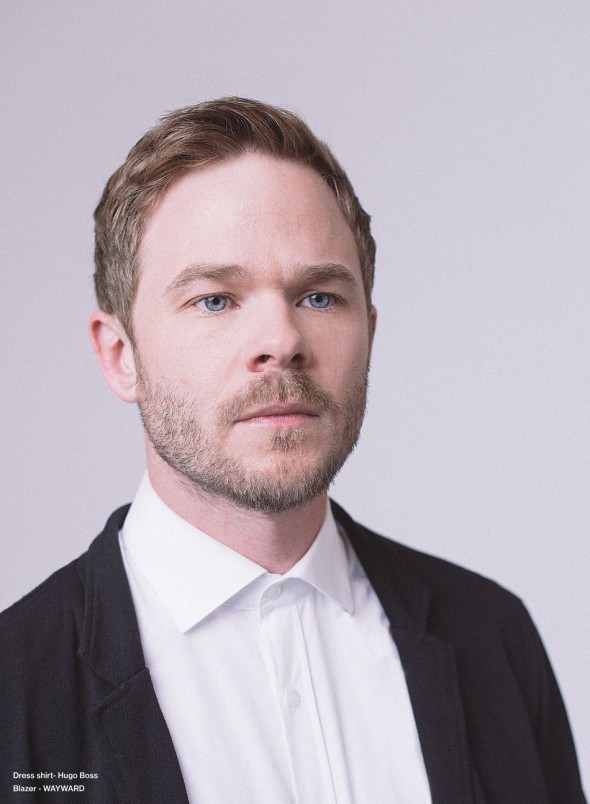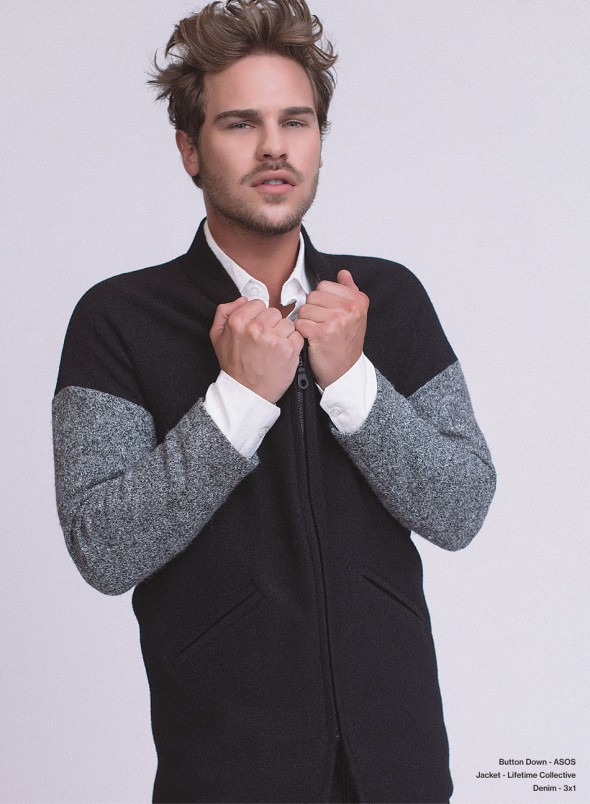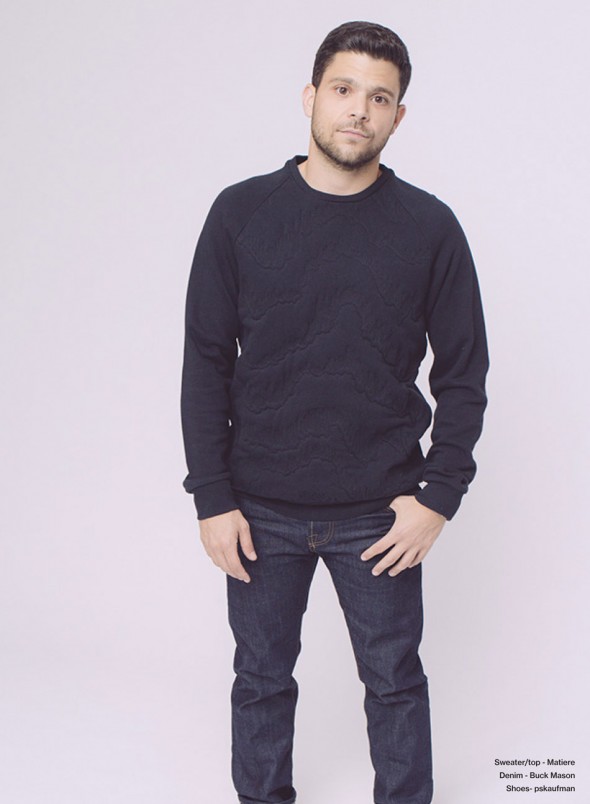
Shawn Ashmore
The Actor Who Came in From The Cold
Shawn Ashmore’s recurring role as Ice Man in the incredibly successful X-Men franchise may seem like a lucky break, but the unassuming, well-spoken Canadian had already enjoyed a long and successful career in his home country, having acted since he was eight or nine. “It’s kind of cool for Canadian actors, growing up making smaller projects, learning the craft of acting, making mistakes out of the spotlight. It’s not such an image machine as in LA. It’s not about being rich and famous.” Ashmore’s recurring role in X-Men is changing all of that. “It’s been a unique experience,” says Ashmore, “to re-inhabit a character ever four years or so.” It means, among other things, that he’s been able to bring his own personal growth to the character. The physical time spent on set, however, is just a small percentage of his life as an actor. For every X-Men movie, he’s got six or seven other roles. “I love the balance - I love every time I get the call to jump into a leather outfit and be a superhero. But jumping into another role is just as exciting.”
For the TV series The Following, which is currently in its third season, Ashmor has been riding an emotional roller coaster of sorts. “You never know what to expect for your character. It’s like reading a book, but you don’t get the chapter until right when you are preparing for it. The beginning of the new season is daunting- you have no idea what to expect emotionally.” This role has been a learning experience for Ashmore, who describes how he has learned about gun culture, explored new ideas, and felt a new degree of physicality playing his character: “It’s scary to feel that, to relate to some behavior. Playing my character has given me a sense of power I never thought I’d experience.”
Ashmore’s most difficult and rewarding role to date, however, was for a Canadian film in which he played Terry Fox, who lost his leg to cancer and ran across the country, making him a national phenomenon in the 1970’s and gaining him a spot on the Canadian $1 coin. “It’s terrifying to do justice to a hero.” Fox’s family gave Ashmore a private journal written by Fox. “To read someone’s private words is so powerful. You spiritually take that journey.”

Tessa Thompson
The Voice
Tessa Thompson’s IMDb page claims that the actress was “discovered as a child,” a misconception she has repeatedly attempted to clear up. “I’ve written the people at IMDb about ten times,” says the whip-smart actress, who explains that she merely shot one commercial as a child because her dad knew the casting director. Thompson grew up in Hollywood, but is quick to specify that she was immersed in the musical culture, not the cinematic one. “It’s like, if you’re born in Detroit, you don’t necessarily want to work in the automobile industry,” she says. Her father was a member of the musical collective Chocolate Genius, and her grandfather was a well-known Mexican bandleader who had a successful radio show. Thompson’s own band, Caught A Ghost, just released its first album. In addition to musical pursuits, Thompson studied Cultural Anthropology. “I had a fantasy about living in another culture,” she says. “I find people interesting.” She relates how she once dressed like a boy to go to the playground with her sister, just to see what it would be like. Which translates pretty directly into her motivation for acting: she likes storytelling, inhabiting a role, and “making people feel things.”
In terms of future projects, after years of just “riding the wave” and accepting most of what was proposed to her, Thompson now has the luxury indulging in her preference for indie films that explore social issues, particularly from the female or African-American point of view. One recent project, Dear White People, which was featured at Sundance, was a real departure for Thompson because it was a satire. “Drama comes easy. Comedy is scary. It’s more objective. But anything scary is worthwhile.” She also worked on Selma, an Oprah/Plan B- produced movie, playing activist Diane Nash, which she considered a serious responsibility. Thompson says she thinks we are seeing the “return of the black smart-house film,” something that “feels like a movement that touches millennials.” Kickstarter campaigns, such as the one that funded the Veronica Mars film in which Thompson also played a role, are changing the game: “Hollywood has a habit of looking at the money first. But thanks to Kickstarter, which can prove a market and expand the range of what gets made, new voices are beginning to be heard in the industry.” With her acting and musical work, and a few more top-secret writing projects she has percolating, Tessa Thompson is bound to be one of those voices.

Grey Damon
The Not So Accidental Actor
Grey Damon thought he would grow up to be a cartoonist or an EMT, but then, he says, he fell into acting. “I know it sounds ridiculous to say that someone fell into a job,” he allows, before describing how he only came to LA to see the ocean, which, having grown up in Indiana and Colorado, he had never seen, and because he didn’t have the money to travel the world. He discovered the LA party scene, people he describes as “lost souls,” which pushed him to find a purpose, something on which he could focus. Acting seemed an unlikely candidate, but then, he realized, acting was the one thing that, despite the insecurity, the sense that any job could be the last, was something that could provide him with constant challenges and growth. “People can easily lose themselves in this profession, but I tend to find myself more with each role,” says the actor, who has played parts in True Blood, Percy Jackson, Friday Night Lights, Twisted, and Star Crossed, among others. Friday Night Lights, which was his first major role, says Damon, introduced him to a unique way of filming, and its realism challenging his acting skills in new ways. And he credits a part he played in the TV series True Blood as the one that truly freed him as an actor and permitted him to completely jump out of his own skin and inhabit a character. Asked if he was a fan of the show before getting that part, he shakes his head: “I was so poor when I first came out to LA that I didn’t have a TV. Now, if I watch anything, it’s on a recording. And then I go into work mode- I’m always analyzing.”
Though he still occasionally draws for fun, Damon claims he can be scattered, and feels he must work hard to truly focus on his craft. Even staying in shape for a role is taken on as a serious responsibility. “I have a trainer who helps, but ultimately it’s up to me.” Currently, the actor describes himself as “a virtual shut-in,” busily researching the 1960’s. He is fascinated, he explains, by what he has learned so far of that decade, which he describes as “pivotal for our nation.” “The people, too,” he finds, “were more poised, more articulate, had a different education.” He’s also been putting in time at the shooting range. This research is for Aquarius, a new show in which he will star alongside David Duchovny, playing an undercover cop. “Imagine, I get to detect with Fox Mulder,” cracks the handsome actor. Not bad for someone who just fell into acting.

Ambyr Childers
Quick Change Artist
When the petite, delicate-featured actress enters the studio for an early morning photo call accompanied by her mom, it’s hard to believe that she is in fact herself a mother of two with a long career behind her. If anything, she looks like a freshly scrubbed teenager. After only the briefest of interludes in the makeup chair, Ambyr Childers has transitioned to glamorous photo-ready actress mode. It would seem that one of the factors in Childer’s success in the entertainment industry certainly lies partially in her looks- those delicate features and coloring that can oscillate between ethereal and sun-kissed allow her to readily transform as needed. Like many actors, Childers, who started acting as a child admits, “it was exciting not having to go to school,” paid her Hollywood dues by appearing in innumerable TV commercials. She shudders as she recalls an especially taxing Chef Boyardee shoot, involving ingesting nearly frozen food merely made to look hot by means of a portable steamer. After several small roles, things got serious, and again, Childers had to choose between school and her craft, ultimately giving up a golf scholarship in favor of a three-year stint on the soap opera All My Children, an experience she likens to “acting boot camp.”
Today, the actress feels she is finally gaining a certain level of respect in the industry, accessing roles that allow her to “do good work.” She truly appreciates the challenge of completely inhabiting a different persona, and relishes period pieces that require studying history and “attention to the way women spoke and carried themselves at that time.” Her favorite era, she says, was the forties and fifties, because of the fashion and the particular brand of glamour present in those decades. Recently, Childers has appeared in 2 Guns, The Master, Gangster Squad, We Are What We Are, and can be seen in the upcoming Vice. Juggling an increasingly hectic life, Childers is now essentially looking for material that “is worth not being home with the kids.”

Jerry Ferrara
Slow Burn
Jerry Ferrara knows what it’s like to develop a character slowly, over time, and the same thing could be said for his career. The native Brooklynite is perhaps best known for his work as the iconic character of “Turtle” in the cult series Entourage, which ran for a whopping 96 episodes. “It’s nice to work on something for so long,” he says. “You become a family. A lot of actors say that, but in my case it was true—I got to work with the people I actually spent my free time with.” And in terms of his craft, the long-running series also posed an interesting conundrum: “Actors always want evolution—to peel the onion. Sometimes the audience doesn’t want too much evolution—you have to try to evolve slowly over time. It’s a slower burn. In a movie, you only have two hours to do that.”
Ferrara, who got into acting relatively late in life, as a result of his absolute love for TV and movies, sees his career as a life-long pursuit, and is not distraught by the end of Entourage. On the contrary. “There are now so many ways to get out there I’d like to explore—podcasts, web series…” Not to mention, since the end of Entourage, Ferrara has done six huge movies, including the comedy Think Like a Man (and its sequel), the Navy Seal drama Lone Survivor alongside Mark Wahlberg, and the blockbuster Battleship. Nevertheless, Ferrara says he finds himself with a healthy dose of free time, which he spends boxing, playing basketball and golf, and producing the aforementioned, mainly sports-based podcasts, which evolved from his love of radio.
“Podcasts are great because they’re easy to launch, they’re immediate. On the first episode I call my mom and tell her how she’s ruined social media for me.” Ferrara is quick to signal that he’s joking—social media, he explains, is “the most powerful, game-changing thing in my generation.” Not to mention, for an actor, it can mean instant fan mail, or instant criticism. “Not everyone’s going to like your shit. Now I laugh at it. The more brutal it is, the more I laugh.” A healthy attitude that should guarantee that Ferrara’s career will continue to develop in interesting ways, for a long time to come.
Text Karena Akhavein
Photography Ben Miller
Makeup Crystal Tran
Hair Kelsey Petersen
Stylist Stephanie Powers / popcitystyle

